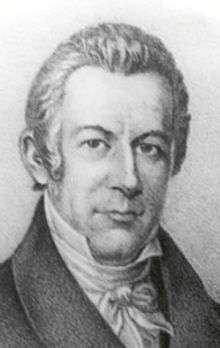William Findlay (governor)
| William Findlay | |
|---|---|
 | |
| United States Senator from Pennsylvania | |
|
In office December 10, 1821 – March 3, 1827 | |
| Preceded by | Jonathan Roberts |
| Succeeded by | Isaac D. Barnard |
| 4th Governor of Pennsylvania | |
|
In office December 16, 1817 – December 19, 1820 | |
| Preceded by | Simon Snyder |
| Succeeded by | Joseph Hiester |
| Treasurer of Pennsylvania | |
|
In office 1807–1817 | |
| Preceded by | Isaac Weaver, Jr. |
| Succeeded by | R. M. Crain |
| Member of the Pennsylvania House of Representatives | |
|
In office 1804-1807 | |
| Personal details | |
| Born |
June 20, 1768 Mercersburg, Pennsylvania |
| Died |
November 12, 1846 (aged 78) Harrisburg, Pennsylvania |
| Political party | Democratic-Republican Party |
| Spouse(s) | Nancy Irwin (?-July 27, 1824; her death) |
| Signature |
|
William Findlay (June 20, 1768 – November 12, 1846) was the fourth Governor of Pennsylvania from 1817 to 1820, and a United States Senator from 1821 to 1827.
Biography
He was born in Mercersburg, Pennsylvania, Franklin County, Pennsylvania, June 20, 1768 to Samuel Findlay and Jane Smith. He was a brother of James Findlay and John Findlay.[1] Samuel Findlay's father, equally named Samuel Findlay, was born in County Londonderry in Ulster in 1711, settled in the Province of Pennsylvania in 1730 and died in Mercersburg, Pennsylvania in 1739.[2]
After receiving a common-school education, he became a farmer, and early took part in politics as a Jeffersonian Democrat. He served as brigade inspector in the state militia, studied law, was admitted to the bar and commenced practice in Franklintown, Pennsylvania. He served in the Pennsylvania House of Representatives in 1797 and 1804-1807, and was state treasurer from 1807 to 1817.
In 1817, Findlay was nominated for the post of governor in the state's first open convention. He was elected governor and served until 1820. He was the first governor to lead the state from its new capital of Harrisburg, running many of the functions of government out of his own home while the new capitol building was under construction. He was defeated for re-election in 1820 by Joseph Hiester.
In 1821, he was elected as a Democratic Republican (later Jacksonian Democrat) to the United States Senate to fill the vacancy in the term commencing March 4, 1821, caused by the failure of the legislature to select someone. He served from December 10, 1821, to March 3, 1827. He was not a candidate for re-election in 1826. In the U.S. Senate, he served as chairman of the Committee on Agriculture (19th Congress). Later, he served as the fifth treasurer of the U.S. Mint from 1827 to 1841. He resigned due to illness.
He sold the Findlay Farm to Benjamin Jordan and Edward Crouch in 1823.[3] He died in Harrisburg, Pennsylvania, and his remains were interred at Harrisburg Cemetery.
Family
He was the brother of United States Congressman John and United States Congressman and Cincinnati mayor James Findlay.
William Findlay married Nancy Irwin (1763–1824), who became Pennsylvania's First Lady from 1817 to 1820. They had two children, Jane Findlay Shunk (1792 - 1878) and John King Findlay. Nancy Irwin Findlay died on July 27, 1824, and is buried in Harrisburg Cemetery.
William Findlay's son, John King Findlay (born near Mercersburg, May 12, 1803; died in Spring Lake, New Jersey, September 13, 1885), was a noted jurist. He graduated from the United States Military Academy in 1824, and was assigned to the 1st Artillery of the U.S. Army. He was assistant professor of chemistry, mineralogy, and geology at West Point from August 29 until November 4, 1824, of geography, history, and ethics until April 17, 1825, and was on topographical duty until May 13, 1828, when he resigned. In 1831, he was admitted to the Pennsylvania bar. He was recorder of Lancaster in 1841–1845, judge of the Philadelphia District Court 1845–1851, and president of the 3rd Judicial District of Pennsylvania in 1857–1862. After this he practiced law in Philadelphia. John King Findlay was a captain of militia 1840–1845 and 1852–1856. He published an enlarged edition of Archbold's Law of Nisi Prius (2 vols., Philadelphia, 1852).
William Findlay's daughter, Jane Findlay, married Francis R. Shunk, the 10th Governor of Pennsylvania. She held the position of First Lady of Pennsylvania from 1845 to 1848.
Legacy
Findlay Township in Western Pennsylvania and Findlay Commons on the campus of Penn State University are both named for Governor Findlay.
Notes
- ↑ "FINDLAY, William - Biographical Information". Retrieved 28 October 2012.
- ↑ "Samuel Findlay". Rootsweb.ancestry.com. Retrieved September 19, 2015.
- ↑ "National Historic Landmarks & National Register of Historic Places in Pennsylvania" (Searchable database). CRGIS: Cultural Resources Geographic Information System. Note: This includes Ronald L. Andrews and Paula Stoner Reed (1982). "National Register of Historic Places Inventory Nomination Form: Findlay Farm" (PDF). Retrieved 2012-02-04.
References
- United States Congress. "William Findlay (id: F000122)". Biographical Directory of the United States Congress.
- William Findlay at Find a Grave
 Wilson, James Grant; Fiske, John, eds. (1900). "Findlay, William". Appletons' Cyclopædia of American Biography. New York: D. Appleton.
Wilson, James Grant; Fiske, John, eds. (1900). "Findlay, William". Appletons' Cyclopædia of American Biography. New York: D. Appleton.
External links
| Political offices | ||
|---|---|---|
| Preceded by Isaac Weaver, Jr. |
Treasurer of Pennsylvania 1807–1817 |
Succeeded by R. M. Crain |
| Preceded by Simon Snyder |
Governor of Pennsylvania December 16, 1817 – December 19, 1820 |
Succeeded by Joseph Hiester |
| United States Senate | ||
| Preceded by Jonathan Roberts |
U.S. Senator (Class 1) from Pennsylvania December 10, 1821 – March 4, 1827 Served alongside: Walter Lowrie, William Marks |
Succeeded by Isaac D. Barnard |

